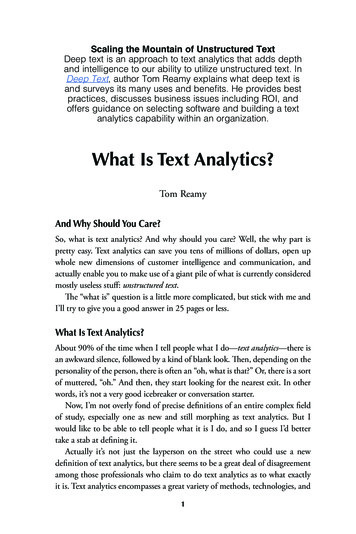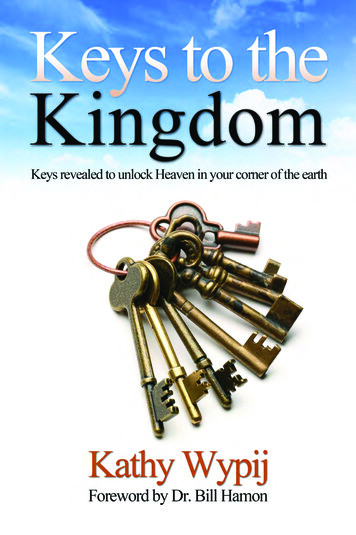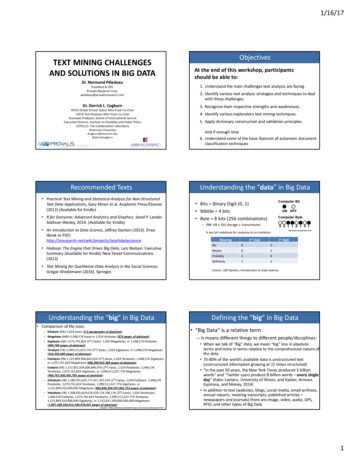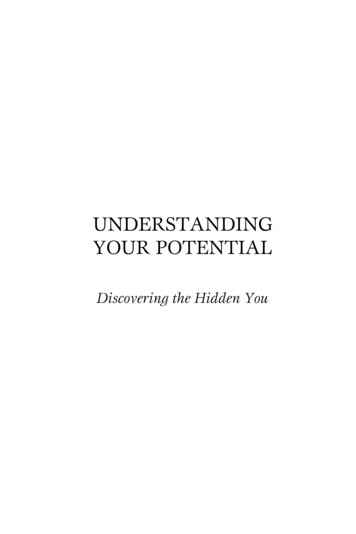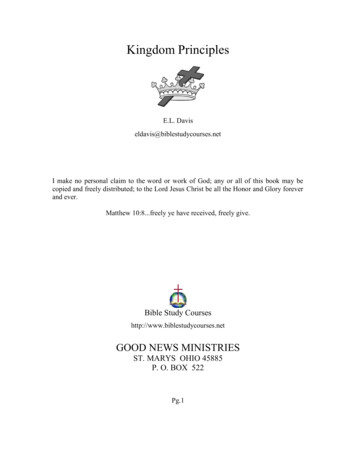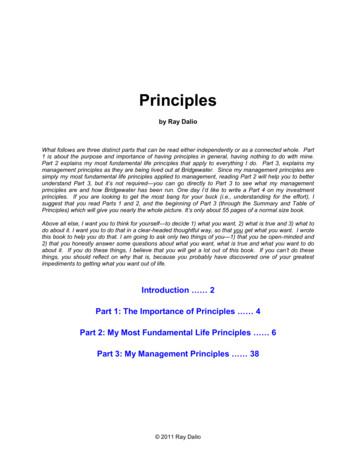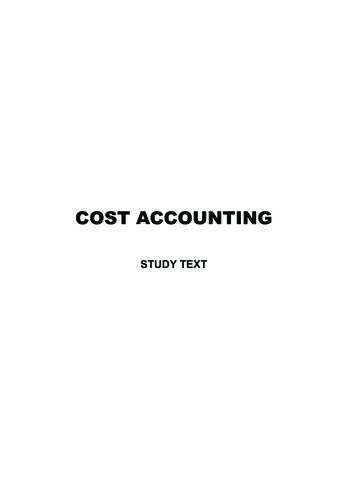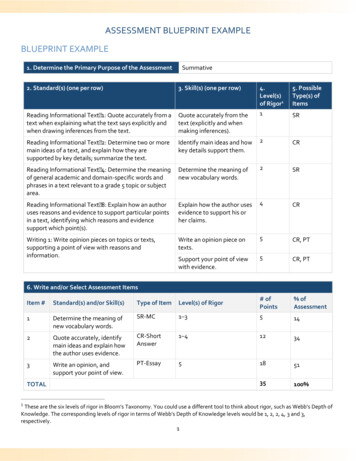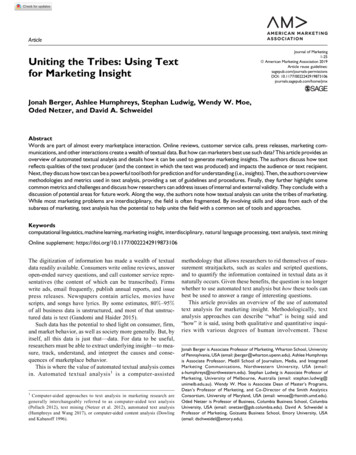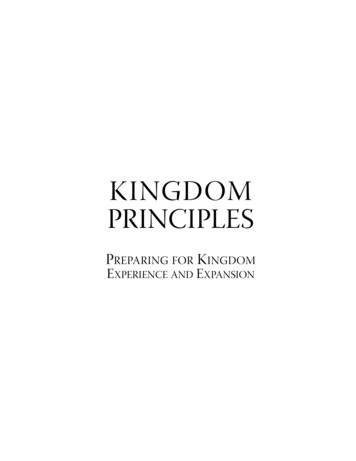
Transcription
KINGDOMPRINCIPLESPREPARING FOR KINGDOMEXPERIENCE AND EXPANSION
KINGDOMPRINCIPLESPREPARING FOR KINGDOMEXPERIENCE AND EXPANSIONDr. Myles Munroe
Copyright 2006 — Myles MunroeAll rights reserved. This book is protected by the copyright laws of the United Statesof America. This book may not be copied or reprinted for commercial gain or profit.The use of short quotations or occasional page copying for personal or group study ispermitted and encouraged. Permission will be granted upon request. Unless otherwise identified, Scripture quotations are from the HOLY BIBLE, NEW INTERNATIONAL VERSION Copyright 1973, 1978, 1984 by International Bible Society.Used by permission of Zondervan Publishing House. All rights reserved. Scripturequotations marked (NKJV) are taken form the New King James Version. Copyright 1982 by Thomas Nelson, Inc. Used by permission. All rights reserved. Please notethat Destiny Image’s publishing style capitalizes certain pronouns in Scripture thatrefer to the Father, Son, and Holy Spirit, and may differ from some publishers’ styles.Take note that the name satan and related names are not capitalized. We choose notto acknowledge him, even to the point of violating grammatical rules.Cover photography by Andy Adderley, Creative Photography, Nassau, BahamasDestiny Image Publishers, Inc.P.O. Box 310Shippensburg, PA 17257-0310“Speaking to the Purposes of God for this Generationand for the Generations to Come.”Bahamas Faith MinistryP.O. Box N9583Nassau, BahamasFor Worldwide Distribution, Printed in the U.S.A.HardcoverISBN 10: 0-7684-2373-2ISBN 13: 978-0-7684-2373-0PaperbackISBN 10: 0-7684-2398-8ISBN 13: 978-0-7684-2398-3This book and all other Destiny Image, Revival Press, MercyPlace,Fresh Bread, Destiny Image Fiction, and Treasure House booksare available at Christian bookstores and distributors worldwide.Hardcover1 2 3 4 5 6 7 8 9 10 11 / 09 08 07 06Paperback1 2 3 4 5 6 7 8 9 10 11 / 09 08 07 06For a U.S. bookstore nearest you, call1-800-722-6774.For more information on foreign distributors, call717-532-3040.Or reach us on the Internet:www.destinyimage.com
rTABLEOFC ON TEN TSPreface . . . . . . . . . . . . . . . . . . . . . . . . . . . . . . . . . . . . . . . . . . . . . . . . . . . .7Introduction . . . . . . . . . . . . . . . . . . . . . . . . . . . . . . . . . . . . . . . . . . . . . .11Chapter OneThe Priority of the Kingdom . . . . . . . . . . . . . . . . . . . . . . . . . . . . . . . .23Chapter TwoThe Kingdom of God Versus the Governments of Man . . . . . . . . . . .37Chapter ThreeThe Original Kingdom Concept: Colonization of Earth . . . . . . . . . . .57Chapter FourKingdom Concept #1:Understanding the Kingdom Concept of Kings . . . . . . . . . . . . . . . .75Chapter FiveKingdom Concept #2:Understanding the Kingdom Concept of Lord . . . . . . . . . . . . . . . . .97Chapter SixKingdom Concept #3:Understanding the Kingdom Concept of Territory . . . . . . . . . . . .113
Chapter SevenKingdom Concept #4:Understanding the Kingdom Concept of Constitution . . . . . . . . .127Chapter EightKingdom Concept #5:Understanding the Kingdom Concept of Law . . . . . . . . . . . . . . . .141Chapter NineKingdom Concept #6:Understanding the Kingdom Concept of Keys . . . . . . . . . . . . . . . .157Chapter TenKingdom Concept #7:Understanding the Kingdom Concept of Citizenship . . . . . . . . . .177Chapter ElevenKingdom Concept #8:Understanding the Kingdom Concept of Culture . . . . . . . . . . . . .189Chapter TwelveKingdom Concept #9:Understanding the Kingdom Concept of Giving to the King . . .203
rP REFACEWhilewriting this book, I have at some time privatelypondered the following questions:1. Why is there so much hatred in the world?2. Why do we discriminate against people who possesshuman value?3. Why is there racism in the world?4. What are the benefits of war?5. Why do men in every generation pursue power at theexpense of peace?6. Why are there so many religions?7. Why do the religions conflict?8. Why can’t we love one another on earth?9. Why is no one religion good enough for all men?10. What can I do to make a difference in this world?11. Why is there always tension between politics and religion?12. Will there ever be global peace and harmony on earth? 7
Kingdom Principles 13. Why has man’s scientific and intellectual advancementnot been able to solve his social, cultural, and religiousproblems?14. Is there hope for our world?15. What about the future for our children? What kind ofworld will they live in?Simply asking these questions can ignite a spirit of depressionand despair because they expose the deficiencies and defects ofhumanity and cast a somber cloud of doubt about our achievementsas a race as well as our potential to improve our lot.However, I wish to declare with positive hope and excitementthat this book presents the solution—an idea that is older than timeyet as fresh as tomorrow in addressing the heart cries of humanityin our search for a better world. This solution is not found in religion or politics but in an idea that has been misunderstood for sixthousand years—a concept that was established at the foundation ofcreation but then was lost. It is an idea that provides for the value,equality, significance, and purpose for each of the over six billionhumans on this planet, all of whom deserve the best in life. This ideais about you and me and something that was always ours by divineright. It is a beautiful idea that has been lying dormant for centuriesawaiting our rediscovery.This book is about your original purpose for existence and thesource of meaning behind your life. In these pages you will discoverthe Creator’s divine motivation, design, and mandate for His creation and your role in that creation. After reading this book, you willbe equipped with the knowledge to answer some of the questionslisted above. I am convinced also that you will come to believe, as Ido, that there is hope for mankind, but only as we reconnect to thesource of creation and our Creator’s original concepts for life onplanet earth. 8
Preface Moses, the great freedom fighter and former prince of Egypt,first recorded this idea 3,500 years ago in his writings, documentingthe creation narrative. But it was already an ancient concept even inhis day. Then, 2,000 years ago, this wonderful idea was reintroducedby a young country teacher from Galilee but later was misunderstood and lost in the complicated formation of another religion.What is this idea? The Kingdom!When one hears the word kingdom, immediately many differentideas, concepts, and pictures come to mind. Most of our concepts inlife are the result of our culture, social development, and formal andinformal education. We are products of our culture and interpretthe world through our mental conditioning.The concept of kingdom in its original and pure sense has beenlost to our modern world. Kingdom as a concept does not exist anymore in the minds of people in Western civilization, particularly inthe past few generations, because all the prototypes either have beendestroyed or abandoned. Because there are no kingdoms or remnants of kingdoms left in the western world, we live in a generationwhere the true meaning of the greatest message ever told cannot befully understood.It is this concern that this book will attempt to address. The goalof this book is to reintroduce the concepts, principles, and nature oftrue authentic kingdoms as presented by the Creator and show thesuperior and advantageous nature of kingdom as compared to anyreligion, political ideology, government system, or social program.Join me as we explore and understand the precepts and principles of“the Kingdom.” 9
rI N TRODUCTIONThegreatest threat to civil society is mankind. Everyday the flood of images on our television screenstells the sad story. Blood, death, diplomacy, conflict,hatred, fear, poverty, starvation, rape, genocide, refugees and humanmigration, natural disasters, daily bombings, economic uncertainty,immigration, corporate corruption, moral decay, sexual revolution,and clash of counter cultures—all of these testify to the undeniablefact that we are our own worst enemy.All of our universities, cyber-space technology, blackberries,think tanks, G-8 meetings, fiscal and immigration policies, medicaladvancements, social experiments, religious conferences, peacemarches, and declarations of cease-fire and peace on earth all seemto collapse at the mercy of our own self-imposed destructive spirit.We build buildings and then bomb them; we make weapons andthen use them on ourselves; we invent medicines that heal and thenwithhold them from the sick; we improve the World Wide Web toenhance global communication and then use it to destroy the moralfiber of our children. We are our own greatest enemy. 11
Kingdom Principles THE SOURCE OF RELIGIONAll of this is compounded by our establishment of sophisticatedreligions into which we retreat to escape the social chaos we havecreated. Religion is the most powerful force on earth. Despite theclaims of many to the contrary, everyone on earth is religious.Religion is defined as the adherence to a set of beliefs that regulatethe moral, social, and ritualistic behavior of the individual. This definition would include the so-called atheist, secularist, communist,socialist, humanist or agnostic, for they all adhere to a belief systemof some kind, even if it is the belief that there is no providential component in creation or life as we know it, or a belief in the power ofthe human as the supreme measure of truth and right.Virtually every major problem in history and in our contemporary world can be traced to some religious foundation. Religion hasmotivated the massacre of millions over the years in such horrificevents as the Crusades, the Inquisition, and wars related to theProtestant Reformation and the Catholic Counterreformation.Slavery, ethnic cleansing, apartheid, segregation, racial discrimination, and other oppressive practices all have been justified by somereligious code or system.Even this new millennium commenced with definitive acts ofreligious terrorism. The terrorist attacks of September 11, 2001 sentshock waves through the global nervous system of mankind andcontinues today to fuel the fires of conflict, hatred, fear, and murderthroughout the world. How ironic it is that religion, the very thingthat by its nature is supposed to provide the solution to mankind’sproblems and provide hope and faith for life, has itself created moreproblems throughout history than it has solved.Perhaps this is one reason so many millions have turned awayfrom all forms of institutionalized religions and opted to embracesuch philosophies as humanism, communism, and agnosticism.Some have simply given up and lost all hope in humanity. I myselfhave struggled long to come to grips with this dichotomy of human 12
In t r o du c t i o n nature—our desire to worship and serve some deity that we claim tobe benevolent and loving, while at the same time demonstrating adestructive zeal motivated by our “allegiance” to this same deity.Along the way I too lost faith in the concept of religion and in a realsense had to seek for something beyond and superior to these defective practices created by man.Yet religion is a natural phenomenon that exists in some form inevery human culture—and always has. Primitive and modernhuman societies alike manifest religious rituals that define their culture and communal life. This raises the natural question: What is thesource of religion, and why is it such a natural, inherent characteristic of the human spirit?Thirty-five years of research and personal exploration of thisquestion have led me to the conclusion that religion is the result ofan inherent hunger in the human spirit that man cannot define yetmust seek to satisfy. This indefinable hunger, arising from a vacuumcreated by the loss of something man used to possess, drives him topursue answers beyond his own realm. Generations of humans haveattempted to satisfy this hunger through superstitions, sophisticated rituals, customs, and practices that often seem to defy humanlogic and reason. Most human religious activities attempt to dealwith the questions of mankind’s existence and purpose as well as lifeafter death and the unknown spiritual world. Many of these religionsare attractive because they promise their adherents power to controlthe circumstances of their daily lives. Whether or not they can deliver on this promise is another matter.The purpose of this book is to help you address these questionsand to present to you a proposition that goes beyond religionstraight to the heart of mankind’s greatest need and offers a solutionto this universal human search. I am convinced that every person onearth ultimately is searching for two things in life: power and purpose. All of us look for meaning for our existence and the power tocontrol our lives and our circumstances; power to determine thefuture and predict the unknown; power over death and life. We seek 13
Kingdom Principles this purpose and power in many ways: religion, politics, money,fame, notoriety, recognition, influence. Our pursuit of purpose andpower is the primary source and motivation for the development ofreligion.ALL RELIGIONS ARE THE SAMEAll religions are the same in the sense that they attempt toanswer the questions of power and meaning. They all promisepower to control life and circumstances and to explain life anddeath. They all claim to have the truth. They all claim superiorityover each other. They all compare and compete with each other.They all demand adherence to their particular belief system whiledenying the others. They all are motivated by contention and usually thrive in an isolated culture that excludes other segments ofhumanity. In fact, all religions seem to glory in a spirit of segregationand separatism. Rather than uniting humanity with common powerand knowledge of purpose, religion has proven itself instead to bethe great divider of mankind.THE NONRELIGIOUS ANSWERThis is not a religious book but a book about a concept that wasintroduced at the beginning of the creation of man. That concept isthe source of the human search, and its absence is the reason whyman “invented” religion. Before I can attempt to discuss this dynamic concept, it is necessary to refer to the document where it was firstintroduced. In the “book of beginnings,” the first book of Moses, thegreat Hebrew writer and freedom fighter, these words explain thereason for mankind’s search for purpose and power:Then God said, “Let Us make man in Our image, according to Our likeness; let them have dominion over the fishof the sea, over the birds of the air, and over the cattle, 14
In t r o du c t i o n over all the earth and over every creeping thing thatcreeps on the earth” (Genesis 1:26 NKJV, emphasisadded).This statement documents the most important declaration evermade regarding mankind. It declares the motivation, nature, purpose, and mandate behind mankind’s creation. As this statementmakes clear, dominion is the purpose for man’s creation and existence. The word “dominion” here translates the Hebrew word mamlakah, which can also be translated as “kingdom,” “sovereign rule,” or“royal power.” In essence, mankind was created to have rulershipover the earth.The first thing man was given by his Creator was a “kingdom.”This initial assignment and mandate of “kingdom” is the Creator’sprimary purpose and motivation for His human creatures.Dominion sets the framework for all the desires, passions, and activities of mankind and is the key to his fulfillment and personal andcorporate peace. It is also the foundation and source of his need tocontrol and rule his environment and circumstances. It is this kingdom mandate that validates man’s desire for power. Power is naturalto the human spirit.THE LOSS OF POWERMankind’s failure through disobedience to his Creator resultedin the loss of his dominion over the earth. He lost his kingdom mandate, his gift of divine power. In short, man lost his kingdom. It isimportant to note here that when man fell from grace, he lost a kingdom, not a religion. He lost dominion over the earth; he did not loseHeaven. Therefore, mankind’s search is not for a religion or forHeaven, but for his kingdom.This is why religion can never satisfy the deep hunger in theheart of man. Religion is itself the search. No religion can substitute 15
Kingdom Principles for the kingdom or fill the vacuum in man’s soul. The hunger of thehuman heart is for the lost kingdom.THE MESSAGE OF THE BIBLEA careful and honest look at the biblical Script will reveal thatthe fundamental message of this greatly misunderstood Book isabout a King and a Kingdom. The Bible is not primarily about a religion or rituals, but about the establishment of a kingdom rulershipon this planet from the heavenly realm. It is about a divine project ofgoverning earth from Heaven through mankind. In practical terms,the Bible is about a royal family mandated to colonize earth fromHeaven.This kingdom assignment is the priority of God the Creator andthe object of mankind’s inherent pursuit.MISUNDERSTANDING JESUSI believe no one who has ever lived has been misunderstoodmore than the young teacher who happened to be born, not by preference but by promise, through the line of the Old TestamentHebrew patriarch Abraham—Jesus the Christ. MisunderstandingJesus has caused Muslims to reject Him, Hindus to suspect Him,Buddhists to ignore Him, atheists to hate Him, and agnostics to denyHim. But it just may be those who claim to represent Him themost—Christians—who have in fact misunderstood and, therefore,misrepresented Him the most.If my last statement sounds outlandish and way off the mark toyou, let me encourage you to read the rest of this book before closing your mind to this possibility. In my own life I have had to cometo grips with my own personal defects related to my understandingof Jesus and His message. This book will demonstrate beyond doubtthat Jesus’ message, assignment, passion, and purpose were not toestablish a religion of rituals and rules but rather to reintroduce a 16
In t r o du c t i o n kingdom. Everything Jesus said and did—His prayers, teachings,healings, and miracles—was focused on a kingdom, not a religion.Jesus was preoccupied with the Kingdom; it was His top priority, Hisheavenly mandate.Those to whom He came first, the Jews, misunderstood Jesusand saw Him as a rebel, a misfit, and a fanatic. In their minds Hewas, at best, a misguided rabbinical teacher spreading heresies thatcontaminated the teachings and laws of Moses and Judaism. Intruth, they had reduced the message of Moses to a sophisticatedreligion where strict observance of the laws became more important than the original purpose for those laws. And they expectedJesus to do the same. The original intent of God’s mandate to Moseswas not to establish a religion but a nation of people who wouldlove, serve, and honor God—a “royal priesthood [and] a holynation” (see 1 Pet. 2:9).The Muslim misunderstands Him as simply another in a line ofprophets who was a great teacher, a good man, and a great prophet,but who fell short and failed to deliver the finished work of redemption to mankind.The Hindu misunderstands Him as a good teacher, a good man,and just another deity to add to their list of gods to provide a service in their need for spiritual security.The atheist, agnostic, and humanist see him as a mere man, anhistorical figure, whom a group of misguided men transformed intoa god and an object of worship. They acknowledge that Jesus existed but deny any of His miracles as well as His claim to divinity.The media, scientists, and secularists see Him as fair game forinvestigation and criticism. They acknowledge Him as an interestingsubject for arguments, theories, discussion, and debates while ignoring His divine claims and questioning His validity, integrity, andsometimes, His very existence.Christians have misunderstood Him as the founder of a religionand have transformed His teachings and His methods into customs 17
Kingdom Principles and His activities into rituals. Many even have reduced His messageto nothing more than an escapist plan for getting to heaven and Hispromises as a mere fire insurance policy for escaping the pains of atormenting hell.And yet a simple study and review of His message and priorityreveals that Jesus had only one message, one mandate, and one mission—the return of the Kingdom of Heaven to earth. From the verybeginning, Jesus made it clear that the principal need of the humanrace, and the only solution to mankind’s dilemma, was the Kingdomof Heaven. His first public statements reveal this Kingdom priority:From that time on Jesus began to preach, “Repent, for thekingdom of heaven is near” (Matthew 4:17).Blessed are the poor in spirit, for theirs is the kingdom ofheaven (Matthew 5:3).Jesus’ first announcement was the arrival of the Kingdom ofHeaven. His solution to the malnourished and bankrupt humanspirit was not a religion but the Kingdom of Heaven. In other words,if you are spiritually poor, only the Kingdom will satisfy and fulfillyour hunger. The Kingdom is God’s priority and must become ourpriority if we are to overcome the confusion of religions and thethreat of self-destruction.RELIGION VERSUS KINGDOMThe power of religion lies in its ability to serve as a substitute forthe Kingdom and thus hinder mankind from pursuing the genuineanswer to his dilemma. My study of the nature of religion and howit impacts the process of man’s search for the Kingdom uncoveredseveral significant truths:Religion preoccupies man until he finds the Kingdom. 18
In t r o du c t i o n Religion is what man does until he finds the Kingdom.Religion prepares man to leave earth; the Kingdom empowers man to dominate earth.Religion focuses on Heaven; the Kingdom focuses on earth.Religion is reaching up to God; the Kingdom is God comingdown to man.Religion wants to escape earth; the Kingdom impacts, influences and changes earth.Religion seeks to take earth to Heaven; the Kingdom seeks tobring Heaven to earth.Perhaps this is why Jesus addressed the religious leaders of Hisday so strongly when He said:Woe to you, teachers of the law and Pharisees, you hypocrites! You shut the kingdom of heaven in men’s faces.You yourselves do not enter, nor will you let those enterwho are trying to. Woe to you, teachers of the law andPharisees, you hypocrites! You travel over land and sea towin a single convert, and when he becomes one, you makehim twice as much a son of hell as you are (Matthew23:13,15).Then some Pharisees and teachers of the law came toJesus from Jerusalem and asked, “Why do Your disciplesbreak the tradition of the elders? They don’t wash theirhands before they eat!” Jesus replied, “And why do youbreak the command of God for the sake of your tradition?”(Matthew 15:1-3).Thus you nullify the word of God for the sake of your tradition (Matthew 15:6b). 19
Kingdom Principles For I tell you that unless your righteousness surpasses thatof the Pharisees and the teachers of the law, you will certainly not enter the kingdom of heaven (Matthew 5:20).Jesus said to them, “I tell you the truth, the tax collectorsand the prostitutes are entering the kingdom of Godahead of you” (Matthew 21:31b).It seems clear from these words that religion is one of the greatest obstacles to the Kingdom. Perhaps this may be cause for us all totake another look at the power of religion over our lives, culture, andsociety.BACK TO THE KINGDOMChristianity as a religion is well-known, well-established, wellstudied, well-researched, well-recorded, and well-distributed; butlittle or nothing is known about the Kingdom. As a matter of fact,most of those trained in official institutions to understand theChristian faith and propagate its purported message graduate without ever taking a single course in Kingdom studies. Often, no suchcourse is available. The result is that few so-called ordained ministers and priests have any formal instruction at all in any Kingdomconcept. Their priority is in propagating the Christian religionrather than the message and concepts of the Kingdom of God.This perpetuation of the Christian religion and its rituals, customs, and rites has left a great vacuum in the world that must andcan be filled only by understanding the Kingdom.In this book you will learn what a kingdom is, what it consistsof, how it functions, and all the components that make a kingdomunique. You will also discover the difference between a kingdomand a religion, and how it compares with all other forms of government. You will be instructed in principles of Kingdom concepts,how they relate to your daily life and how you can appropriate 20
In t r o du c t i o n Kingdom citizenship here and now. This book will help you appreciate that you cannot appropriate what you don’t understand norexperience what you postpone. This is your practical guide tounderstanding the most important message mankind has everreceived; a message the whole world desperately needs to hear. Thisbook will equip you not only to receive that message but also toshare it effectively with others. 21
Chapter OnerT HE P RIORITYIOF THEK INGDOMtwas hot that morning—over 90 degrees—andhumid. I was just five years old, and excited. Theheat did not bother me because that day I was chosen to lead the school pledge and national anthem. There we allstood, over three hundred of us, in our uniforms—short brownpants, long knee socks, stiff, starched white shirts, our little neckties—holding the Union Jack. As we pledged to honor and submit tothe Queen of our kingdom, we sang the two songs that were the firstones we were required to learn from birth. Every one of us knewevery word, and we sang with gusto and pride:“God save our gracious queen, long live our noble queen, Godsave the queen. Send her victorious, happy and glorious, born torule over us, God save the queen.”Next came the waving of the flag of the United Kingdom ofGreat Britain as our voices filled the air with the second song:“Rule Britannia, Britannia rules the waves, Britons never, never,never shall be slaves.”It has taken me almost a lifetime to understand, appreciate, andin some ways overcome the impact of those history-making experiences of my childhood. Today I understand that what we went 23
Kingdom Principles through in those school days illustrates the nature of kingdoms. Wewere in the process of being fully colonized—taught to become truesubjects of a kingdom and obedient worshipers of sovereignty. Wewere part of a global kingdom whose culture was different than ourheritage. Every day we felt the impact of a foreign kingdom.Even today, 50 years later, the impact of that kingdom is stillseen, felt, heard, and experienced in every part of our independentnation of the Bahamas. I still wear a tie in 90-degree heat; I still drinktea every day; and I still drive on the left-hand side of the street. Insome ways, I suppose, I am still under the influence of that kingdommentally. When the kingdom became our priority, its impactbecame a reality. This book is about another Kingdom whose flag weall should hold and another King to whom we should sing praises.REDISCOVERING THE PRIORITYThe greatest secret to living effectively on earth is understanding the principle and power of priorities. Life on earth holds nogreater challenge than the complicating daily demand of choosingamong competing alternatives for our limited time. Our life is thesum total of all the decisions we make every day, and those decisionsare determined by our priorities. How we use our time every dayeventually defines our lives. Life was designed to be simple, notcomplicated, and the key to simplifying life is prioritization.Identifying the correct and right priority of life is the key to a successful and fulfilled life. So then, what is the principle and conceptof priority?Priority is defined as: The principal thing. Putting first things first. Establishing the most important thing. Primary focus. 24
T h e P r i o r i t y o f t h e King d o m Placing in order of importance. Placing highest value and worth upon. First among all others.If our priorities determine the quality of life and dictate all of ouractions and behavior, then it is essential that we understand andidentify our priorities. The greatest tragedy in life is not death butlife without a purpose—life with the wrong priorities. Life’s greatestchallenge is in knowing what to do. The greatest mistake in life is tobe busy but not effective. Life’s greatest failure is to be successful inthe wrong assignment. Success in life is measured by the effectiveuse of one’s time.Time is the true measure of life. In fact, time is the currency oflife. How you spend your time determines the quality of your life anddeath. You become whatever you buy with your time. Always beaware that everything and everyone around you is vying for yourtime. Your time is important because your time is your life. And thekey to effective use of your time is establishing correct priorities.First things first!When your priorities are correct, you preserve and protect yourlife. Correct priority is the principle of progress because when youestablish your priority according to your purpose and goals thenyour progress is guaranteed. Correct priority protects your time.When you set the right priorities, then you use your time for intentional purposes; your time is not abused or wasted. Correct priorityprotects your energy. Correct priority protects your talents andgifts. Correct priority protects your decisions. Correct priority protects your discipline. Correct priority simplifies your life.Failure to establish correct priority causes you to waste your twomost important commodities: your
4. What are the benefits of war? 5. Why do men in every generation pursue power at the expense of peace? 6. Why are there so many religions? 7. Why do the religions conflict? 8. Why can’t we love one another on earth? 9. Why is no one religion good enough for all men?
